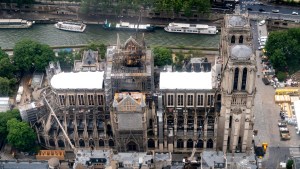It’s been two years since the devastating fire at Notre Dame de Paris, but the reconstruction effort is well underway. In order to meet President Macron’s ambitious April 2024 reopening date, however, the process needs to be accelerated. Now, restoration teams are turning to a digital technology called Building Information Modeling (BIM) that attends to every minute detail.
BIM is the process of creating and managing information for a built asset. With new construction, BIM would record everything from required resources to practical functionality of a building. For a restoration project, such as Notre Dame, BIM provides a detailed description of what was there to provide workers with as exact a model as possible.
The model
These BIM models can be very intricate, as can be seen in the video above. This is an example of a BIM model of Notre Dame that was compiled in 2020. It is not the exact BIM the restoration crew is working with, but it gives a glimpse into a BIM’s use and value. The model is so detailed that it records individual panes of stained glass.
To ensure precision, the digital models utilize laser point scans that record the building’s dimensions and placement of debris. These scans have also catalogued the wide array of art displays and artifacts ornamenting the cathedral. According to Architosh, the team from Autodesk, the company providing the BIM, created some 12,450 unique objects for the digital model.
BIM acceleration
Emmanuel Di Giacomo, Autodesk BIM Ecosystem Manager for Europe, explained that the BIM will help accelerate the reconstruction in three primary areas. It will help workers logistically determine where to place cranes and where resources should enter. Secondly, the model should help workers with safety and risk management. Finally it is expected to streamline workflow between planning and construction.
Di Giacomo went on to note that creating this BIM was a little harder because Notre Dame was never well documented in 2D drawings. Such blueprints often act as a starting point for BIMs, but few survey-created documents existed. The process took a full year, but the results, Di Giacomo said, demonstrated that it would be helpful in accelerating the project.
Now, Notre Dame is preparing to restore the roof, which will utilize 1,000 oaks from 200 French forests. In this effort BIM will once again lend a hand. The plan is to update the wooden roof to bring it up to modern safety standards with a sprinkler system. In this case, BIM will help identify the most effective placement of the fire suppression system and wiring.
Visit Architosh to learn more about the digital technology that will help restore Notre Dame de Paris.

